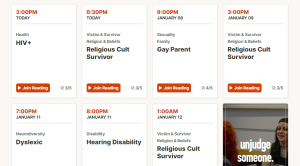Reader of the Month: Kathy Castle from the University of Nebraska-Lincoln
This time, our Reader of the Month—perhaps Reader of the past several months—is Prof. Kathy Castle. Last September, Kathy began introducing the Human Library to her students at the University of Nebraska-Lincoln and since then, she has been actively exploring the learning potential of our platform. We asked Kathy a few questions to gain some insights into how her new course, the Empathy Project, has been progressing during its first semester, but also how the library has impacted her own perspective on teaching.
First Encounter with the Human Library
At the start of our interview, we asked Kathy about her first experience with the Human Library, which she remembers very clearly. It was when she read the title “Former Drug User,” which made her feel uncertain about asking appropriate questions. But only a few minutes into the session, she was put at ease by the straightforward approach of the Book in the reading, which encouraged Kathy to not hesitate with asking questions and use the potential of the conversation to the fullest. Inspired by her own experience, Kathy wanted to get to know more about the Human Library and started exploring other titles from our Bookshelf. Working at the University of Nebraska-Lincoln, she was also curious about the potential of introducing the Human Library to her students.

Kathy Castle, Professor at the Department of Communication Studies at The University of Nebraska-Lincoln.
The Importance of Real Life Experience in Academia
Kathy developed a new syllabus for a course titled The Empathy Project, which aims to help communication students cultivate empathy and equip them with essential skills for their future careers in the communication field.
‘’In developing The Empathy Project, it became clear that while I could provide my students with scientific literature that supports specific evidence-based strategies for the cultivation of empathy, it was never going to be enough to accomplish what I was aiming to accomplish with this class. For example, we can’t learn about cultivating and communicating empathy in the context of human suffering without learning about power and positionality and the wide variety of ways some of us experience bias, stigma, and marginalization. If my students have limited understanding of what it is to experience these things, their ability to empathize well is quite limited.’’
Acknowledging the limitations of teaching empathy based solely on theoretical learning, Kathy recognized the importance of embedding a practical component in the course to achieve her objectives. Teaching students to develop greater empathy in both their personal and professional lives requires hands-on practice in a safe environment, provided by individuals willing to share their personal experiences in an honest and neutral framework.
Kathy reached out to the Human Library to see if we could embed our online Bookshelf into her new course. This way, the students would be able to select topics that are most relevant to them and later share their experiences during class discussions.

An overview of some of the topics available with the Human Library online bookshelf.
“Our stories are our own to choose whether or not to share with others. The Human Library is full of people who want to share their stories for the benefit of others’ learning. The virtual platform has enabled my students to learn from others who are vulnerable in talking about specific experiences of marginalization, stigmatization, and/or suffering,’’ says Kathy.
Real Impact is the Best Feedback
She is pleased to see the positive reactions of her students to the new course, as many students say they’ve noticed a distinct increase in their own curiosity about others who differ from them.
“Students were challenged in every reading to de-center themselves and their experiences and to center the experiences of the person sharing their story. They had to think through the ways in which they were both similar to and different from each book. They had to identify when they were experiencing “empathy blocks” and work to understand and address them.”
Many of Kathy’s students had suggested that the learning process they have been through should be mandatory for all students, which Kathy tends to agree with.
Human Library as a Part of the Curriculum
To anyone considering introducing the Human Library Online Bookshelf as part of a school curriculum, she recommends embracing the discomfort that may arise during interactions with Human Books. This discomfort, she notes, holds significant potential to foster meaningful learning outcomes:
“My advice would be to embrace this unique platform and be clear about “why” introducing the Human Library into the curriculum advances the students’ abilities to meet the learning outcomes and also explain “how” the Human Library will do that. You will want to be honest about the fact that students will experience discomfort in these readings, some more than others, and then show them how to lean into and learn from that discomfort.”
Prof. Castle will offer her course again in 2026 and plans to continue using the Human Library´s online bookshelf as a key component for students to engage and learn from open books. We welcome all the educational institutions that are interested in library cards for their students to reach out to the Human Library for more details.





